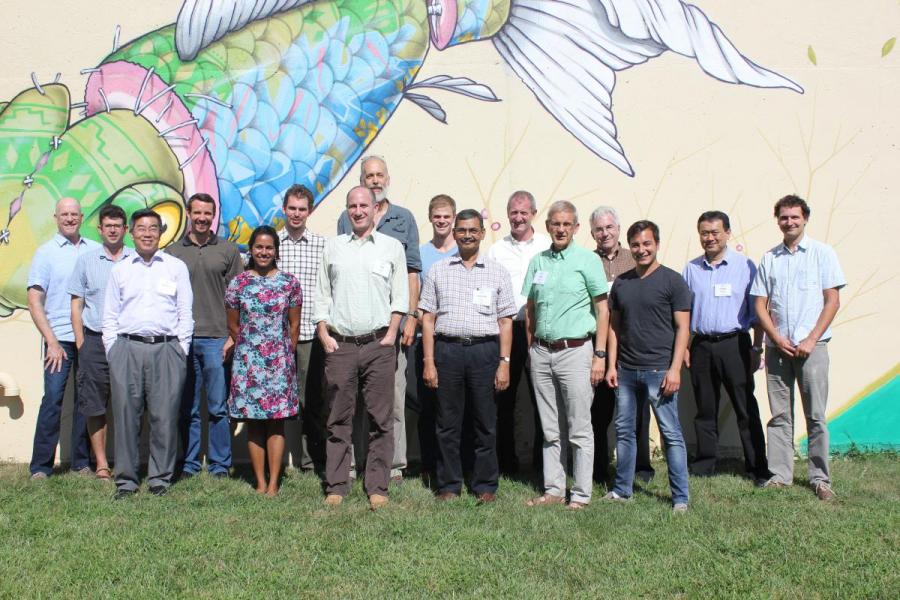
Report Says Antimicrobial Resistance Threatens Human and Planetary Health
Authors call for United Nations to reframe action on antimicrobial resistance as the defense of a global common resource.
For release: September 14, 2016
Contact: communications@sesync.org
ANNAPOLIS, Md – Antimicrobial drug resistance threatens both personal and planetary health, and the issue is as crucial as the global threat of climate change, says Peter Søgaard Jørgensen, research fellow at the Global Economic Dynamics and the Biosphere at the Royal Swedish Academy of Sciences, who is co-principal investigator of a research team at the National Socio-Environmental Synthesis Center (SESYNC) at the University of Maryland.
In a paper titled “Use Antimicrobials Wisely,” published in the current edition of Nature by a nine-member international research team, led by Jørgensen as well as Didier Wernli of the Global Studies Institute in Geneva, Switzerland, the authors advocate for the United Nations to reframe its action on antimicrobial resistance. Microbes are a global, common pool resource, the authors argue. The research team are members of a research pursuit at SESYNC called Living with Resistance. Their new paper is the first in a series of studies that aim to address the socio-ecological dilemmas that constrain society’s response to resistance evolution.
The international group of scholars is led by Jørgensen and Dr. Scott Carroll, an evolutionary ecologist at the University of California, Davis. SESYNC’s approach to socio-environmental research is uniquely qualified to facilitate such an effort, as it supports new interdisciplinary collaborations among scientists to improve understanding of complex problems and how this research can inform public policies.
On September 21, the United Nations will meet in New York to discuss global antimicrobial drug resistance (AMR) and the threats it poses to the world and its people. In this seminal paper, the “Living with Resistance” team advocates a reframing of the action on AMR towards antimicrobial stewardship and an understanding of microbes’ importance to human and planetary health.
The report argues for coordinated action across economic sectors. “No single concern exemplifies this better than the high rate of antibiotic use in agriculture (largely as growth promoters or disease prevention). In the United States, 70–80% of all antimicrobials consumed are given to livestock; agricultural use in the BRICS emerging economies (Brazil, Russia, India, China and South Africa) is expected to double by 2030, as compared to 2010 levels. As a result, antibiotics and resistance genes enter the food chain, soil and the water table, threatening human health,” the authors write.
Co-lead author Dr. Didier Wernli, a senior research associate at the University of Geneva, Switzerland said that “in building a global multi-sectoral response to AMR, it is essential to draw on previous experiences and existing institutional arrangements regarding the global governance of infectious diseases. There is much to be learned about HIV-AIDS, Ebola and Influenza to name but a few.”
“Dr. Jorgensen, Dr. Wernli and colleagues’ paper on the call for the United Nations to reframe action on antimicrobial resistance as the defense of a common resource is a reminder that interdisciplinary synthesis can lead to actionable science,” said Dr. Margaret Palmer, director of SESYNC and Distinguished University Professor at the University of Maryland. “The authors convened at SESYNC multiple times and began framing research questions so that the results will be useful to decision-makers.”
The importance of these research questions are outlined in their paper, which stresses conservation of the microbiotic ‘commons’ that support life on earth. Humans all require microorganisms to survive; from digestive and immune system health to the maintenance of nutrient cycles and water quality. “In other words,” the authors write, “microbes sustain human civilization.”
However, the overuse of antibiotics and other antimicrobial drugs pose a threat to this common good. “Just like CFC [chlorofluorocarbon] gases deplete the ozone layer and greenhouse gases alter our stable climate, antibiotics and other drugs deplete the proportion of microorganisms susceptible to our treatment methods,” says Jørgensen. “To address the resistance challenge sustainably, we must engage all of society in learning actively about the microbial world.”
The authors recognize this problem affects more than earth’s ecosystems; it has significant socio-cultural and economic implications as well. SESYNC is a leader in supporting and facilitating research into complex, policy-relevant problems at the intersection of humans and the environment. “SESYNC recognizes the importance of socio-ecological solutions for antimicrobial resistance,” Carroll said, “and Center support is critical to our success.”
The authors write that “building global resilience to resistance is a long game. But changes can be surprisingly fast when the time is ripe and a plan is ready.” By incorporating policy considerations into their research questions, the team hopes to provide clear and useful means by which action can be taken to conserve antibiotics’ lifesaving capacities and support human and environmental health.
About SESYNC
The University of Maryland's National Socio-Environmental Synthesis Center (SESYNC) in Annapolis brings together the science of the natural world with the science of human behavior and decision making to find solutions to complex environmental problems. SESYNC is funded by an award to the University of Maryland from the National Science Foundation. For more information on SESYNC and its activities, please visit www.sesync.org.
###
DOI: 10.1038/537159a
The paper, “Use antimicrobials wisely,” is available at: https://doi.org/10.1038/537159a